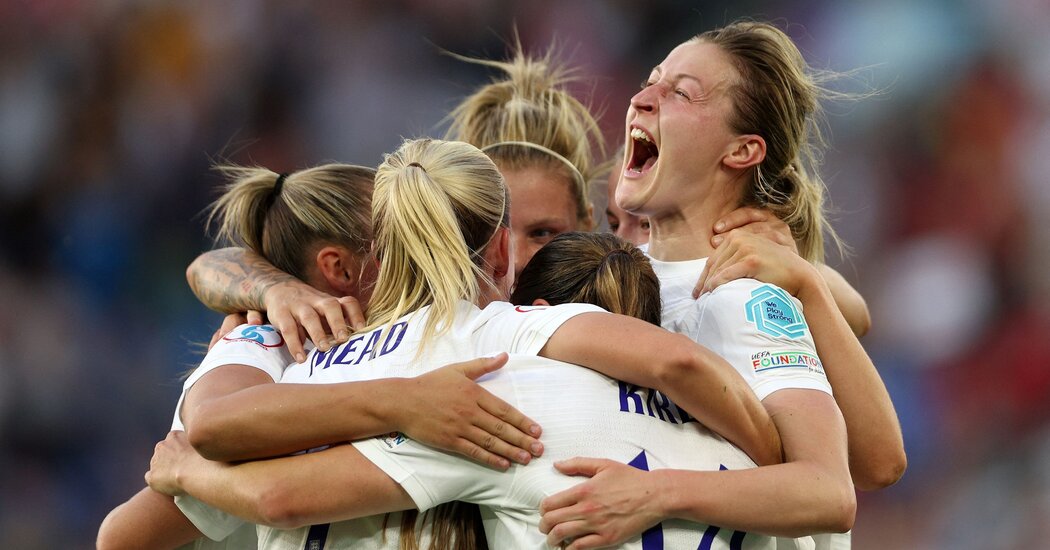
BRIGHTON, England — As the goals rained in, first two in the first 15 minutes, then two more in quick succession, then two more on top of those, all before halftime, it was hard not to think England was sending a message.
Its opening victory at this summer’s European women’s soccer championship had been satisfying enough, a solid if unspectacular first step toward a major prize it has never won. But while the Lionesses had mustered only a single goal, England’s top rivals for the title were filling nets, and raising the stakes.
Norway scored four goals in its first match. Spain and Germany quickly did the same. After France fired five past Italy on Sunday, maybe, just maybe, the tournament’s host country felt it needed to show it was capable of the same.
So England scored eight.
In a tournament boasting contenders but little clarity less than a week in, England’s 8-0 thrashing of Norway on Monday night — delivered on a warm night in front of a delighted crowd in a resort town on the country’s southern coast — might have been the most surprising result yet.
Women’s soccer is changing quickly in Europe, but the meetings of its best teams remain so infrequent that it can sometimes be hard to judge just which teams are pulling ahead of the pack. A great player does not make a great team. A great team does not necessarily need a great player. And with collisions of the top powers few and far between — the last Euros was in 2017, an eternity in the ongoing evolution of women’s soccer on the continent — data is still hard to come by. One can learn only so much from a lopsided win, after all. A 20-0 victory reveals even less.
Spain arrived at this tournament as one of the favorites, but quickly saw its hopes shaken by the loss of Alexia Putellas, the world player of the year, to a knee injury. France left two of its best players at home. Germany brought depth but not brand-name stars.
England vs. Norway was supposed to be something else altogether: a true test of powerful teams, a rare meeting of equals. And then it wasn’t.
Georgia Stanway opened the scoring in the 12th minute, converting a penalty after Ellen White was pulled down in the 18-yard box. Three minutes later, Lauren Hemp made it two, turning in a cross from Beth Mead. The goals were a blur after that. White, after stripping a defender, strolled in alone for her first. Mead got her first, in the 34th minute, on a header, and her second, in the 38th, with some neat footwork in close quarters.
White had the crowd, and her teammates, holding their heads in their hands when she delivered her second, and England’s sixth, with a sliding finish at the back post in the 41st minute. But England wasn’t done: Alessia Russo replaced White in the 57th minute and nine minutes later she was on the score sheet, too.
Norway went to a back five after that, but it hardly mattered. By the time England got No. 8, with Mead completing her hat trick off a rebound, the Norwegians had called it a night: Ada Hegerberg, a dominant striker who never got a sniff of the goal, and the playmaker Caroline Graham Hansen had already been withdrawn, pulled to live to fight another day. Guro Reiten, a crafty wing, left soon afterward.
It was hardly the result either team had expected. Both had opened the tournament just as they wanted: England kicking off with a win over Austria in front of nearly 69,000 fans, the largest crowd ever to see a women’s Euros match, and Norway debuting a day later with a 4-1 romp over Northern Ireland. Like England’s one-goal win, Norway’s wider margin somehow failed to convey just how dominant the victors had been.
The matchup offered a rarity in this tournament: a meeting of equally regarded sides, teams that had traded wins in recent meetings, that seemed a good match.
England has eliminated Norway from the past two World Cups, including a 3-0 victory in the 2019 quarterfinals in France. But that was a very different Norway: talented, yes, but missing the predatory Hegerberg, who left her national team for several years to protest what she considered second-class treatment by the country’s soccer federation.
A long layoff from a knee injury produced a change of heart earlier this year, and her return has brought a change in expectations both for her and her country.
Those remain, battered as they are. But Monday was England’s night, from start to finish after finish after finish.




